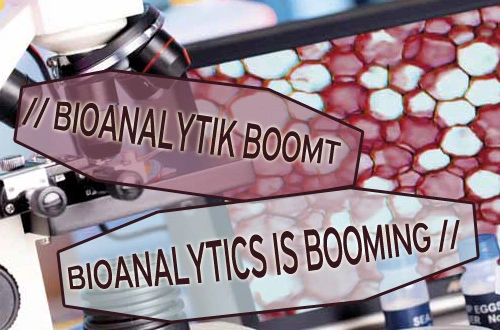Bioanalytics is booming
The Adlershof location is becoming an increasingly attractive prospect for biotechnology companies and institutes. The field is positively flourishing.
Leo Tristram, Managing Partner of RiNA GmbH, and his good two dozen coworkers are sitting on packed suitcases: their biotech company has been given sudden notice to vacate the laboratory rooms on the premises of the Freie Universität Berlin (FU), and Tristram is not pleased. After a long search, he finally found a new address: “I looked over every potential building in Berlin, and now I’ve found what I need in Adlershof.”
They are to move into the new rooms on Volmerstrasse by the end of June – and Adlershof will be a highly innovative company richer for it. Disincorporated from the FU Biochemistry Institute in 1998, RiNA GmbH owns patents on special methods that can synthesise proteins without the need for cells. “The advantage is not having to use living cells that must be cultured and therefore vary in quality,” explained Tristram. As a result, RiNA can always produce proteins of consistent quality in the required quantities and adapt them in almost any way it wants to the requirements of customers on the research, medical, and pharmacological sectors.
The second pillar of this company’s sound growing line involves the production of aptamers. These can deactivate specific functions of individual proteins in cells, making them the ideal molecular tools in medical diagnostics, cancer therapy, and environmental analysis. RiNA will be pushing ahead with these two fields in Adlershof. Tristram explained: “I see here close communication with interesting biotech companies.”
Also interesting is the development at the Federal Institute for Materials Research and Testing (BAM). Here, recent years have seen a reorganisation of the Department of Analytical Chemistry and Reference Materials. For Departmental Manager Prof. Ulrich Panne, this is a necessary step into the future, when bioanalytics will be gaining in importance in many fields of life. Panne’s team is also responsible for biophotonics and protein, food, and immunoanalytics. Soon the division will be moving to the new laboratory and pilot plant building where “the extraordinarily attractive possibilities for cooperation” at the location (according to Panne) will be utilised for chemical and environmental analysis. “ Bioanalytical issues will also be at the focus of the SALSA Graduate School of Humboldt University,” reported the Coordinators Ulrich Panne and Janina Kneipp, Professor at the Humboldt University Institute for Chemistry in Berlin.
